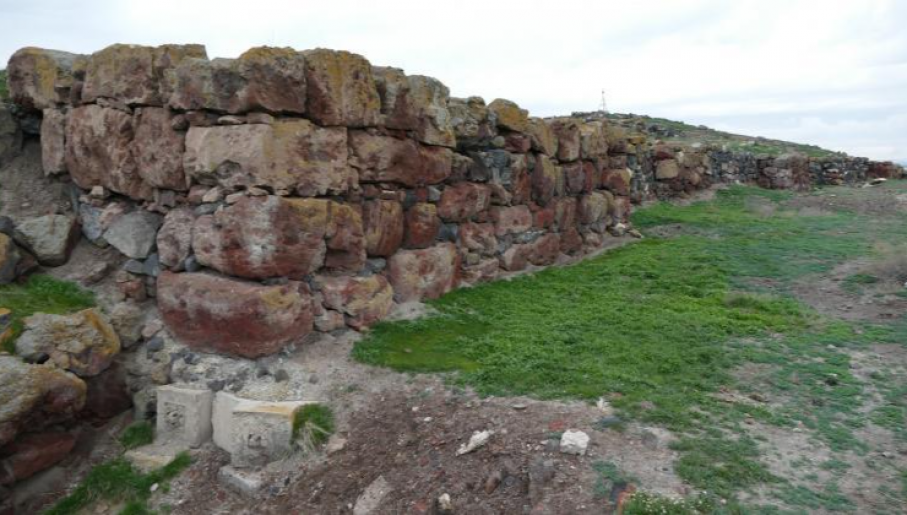Judi Lynn
Judi Lynn's JournalAmerican cities want to recycle their plastic trash in Mexico. Critics call it 'waste colonialism.'
A new recycling plant in Mexicali raises legal and ethical concerns.

Joseph Winters
Mar 31, 2023
Just ahead of this year’s Super Bowl in February, the City of Phoenix, Arizona, published a peculiar press release touting its strategy for waste diversion. Thanks to its relationship with Direct Pack Incorporated, a multinational company that makes and recycles plastic, the city said it would be able to send much of its plastic waste to Mexico for recycling.
“[T]he City of Phoenix stands ready to achieve its goal of hosting the greenest Super Bowl events yet,” the announcement from Phoenix’s public works department said.
The city was referring to a forthcoming Direct Pack facility for recycling plastic items called PET thermoforms — clamshells, berry containers, salad boxes, egg cartons, and similarly shaped containers made from polyethylene terephthalate, one of the seven main kinds of plastic. Direct Pack already has a recycling facility in Guadalajara that it says can recycle tens of thousands of tons of PET thermoforms each year, and it’s been constructing a new one in Mexicali, Mexico, just across the border from California.
The facility is great news for plastic companies based in the U.S., where industry publications say PET thermoform recycling has remained “a struggle.” These companies face growing scrutiny over skyrocketing plastic pollution, and they have spent decades trying to convince the public that recycling is the answer. Direct Pack says on its website that it can give PET thermoforms new life again and again, turning plastic containers like those thrown away at the Phoenix Super Bowl into a “valuable infinite resource.”
More:
https://grist.org/accountability/american-cities-want-to-recycle-their-plastic-trash-in-mexico-critics-call-it-waste-colonialism/
UN: Up to 90 may have died in custody under El Salvador state of emergency
Online News Editor
March 28, 2023 2 minutes read
Geneva, Mar 28 (EFE).- As many as 90 suspects may have died in custody since El Salvador’s anti-gang crackdown began a year ago, the United Nations Human Rights Office said Tuesday.
The spokesperson for that agency said many suspects have been arbitrarily detained since a so-called “state of exception” was imposed on March 27, 2022, by President Nayib Bukele’s administration.
“Over the past year, 65,000 people have been detained. And some of those arrests, including of minors, could be considered arbitrary detentions since they rest on investigations that are largely groundless, or based merely on physical aspects or the social context of the detainees,” Marta Hurtado said.
Referring to those who allegedly died in custody, she said in a press conference that it is especially worrying that “there’s very limited information about investigations into those deaths.”
More:
https://www.laprensalatina.com/un-up-to-90-may-have-died-in-custody-under-el-salvador-state-of-emergency/


Pres. Nayib Bukele's future is so bright, he's just gotta wear shades.


Why This Town Has Celebrated Christmas in February for Nearly 200 Years
The Afro-Colombian residents of Quinamayó have followed a unique tradition: celebrating Christmas 40 days after the traditional date, a custom begun under the subjugation of slavery.
- click for image -
https://archive.ph/anrz6/89d50c85235dabe53c29281f04aa64fb095b7cde.webp
Dancing during Christmas celebrations in Quinamayó, Colombia, last month.
Photographs by Jaír F. Coll
Written by Genevieve Glatsky
Jaír F. Coll and Genevieve Glatsky traveled to Quinamayó, Colombia, to document the town’s four-day Afro-Colombian Christmas festival.
March 30, 2023
The Christmas trees, twinkling lights, and red and green streamers were up, and the main street was lined with tents selling sausages and popcorn, as horse-drawn carts clopped by.
It looked like a typical Christmas festival street scene — except it was February.
Every year, Quinamayó, a town of about 6,000 in southwestern Colombia, observes a tradition that dates back to the era of slavery and has persisted as a way to turn a history of oppression and suffering into a celebration of joy.
On a Saturday night in February, the festival’s main procession began with a group of women in traditional ruffled floral dresses, walking through the moonlit streets. They were soon joined by girls in grass skirts, representing Indigenous groups that Quinamayó’s Black residents consider as part of their shared history of slavery.
In the early 1800s, the town’s Afro-Colombian population was enslaved and forced to work through December, attending to slaveholders’ holiday festivities. So Christmas was celebrated 40 days after the traditional birth date of Jesus — the amount of time that the Virgin Mary is said to have rested after delivery, and right after the end of harvest season.
- click for image -
https://archive.ph/anrz6/9fd392c4c93b2f5311825651f29e4f4e0278f959.webp
Girls playing the role of angels waiting their turn to join the Christmas procession.
- click for image -
https://archive.ph/anrz6/ebb5238a46d1c7648b74a63e99a932a1a60e4aed.webp
Members of a dance group dressing for their performance. Quinamayó’s resident have developed new customs that emerged under the subjugation of slavery.
- click for image -
https://archive.ph/anrz6/f8ea8f615b88e196f60bbae7e2dd674c4de35491.webp
Jeinny Lucumí, 9, as the Virgin Mary and Sofía Peña, 9, as an angel.
More:
https://archive.ph/anrz6#selection-651.0-651.332
Jair Bolsonaro returning to Brazil for first time since 8 January riots
Published
3 hours ago
By Luis Fajardo in Miami & Adam Durbin in London
BBC News
Former Brazilian President Jair Bolsonaro is on his way back to Brazil, after spending months in the US.
The far-right politician is returning for the first time since supporters stormed the Supreme Court, Congress and presidential palace in January.
The riots came after weeks of protests claiming fraud in his defeat to President to Luiz Inácio Lula da Silva.
Speaking at an airport in Florida before boarding a flight, he said he would not lead the opposition to Lula.
But in an interview with CNN, Mr Bolsonaro also said he would help his Liberal Party as a "person with experience" and that he intended to travel across Brazil to campaign in next year's local elections.
More:
https://www.bbc.com/news/world-latin-america-65120313


~ ~ ~
THE MOST MISOGYNISTIC, HATEFUL ELECTED OFFICIAL IN THE DEMOCRATIC WORLD: BRAZIL’S JAIR BOLSONARO
Congresswoman doesn’t “merit being raped.”
December 11 2014, 9:48 a.m
In the lower house of Brazil’s federal Congress on Tuesday, Maria do Rosário – a Congresswoman since 2003 from former President Lula da Silva’s Workers Party (PT) who is also the country’s former Minister of Human Rights under President Dilma Rousseff – stood to praise the National Truth Commission. That Commission was preparing to release a comprehensive report on the systematic human rights abuses perpetrated by the U.S.-supported military dictatorship that ruled the country for two decades until 1985. Congresswoman do Rosário described the military dictatorship as a source of “absolute shame” and condemned it for using murder, torture, sexual abuse, and other violence against dissidents. The Commission’s report was released yesterday in the presence of Rousseff, who was herself imprisoned and tortured by the military regime.
After do Rosário left the podium, Jair Bolsonaro – a right-wing Congressman since 1990 who served in the military during the dictatorship and is still an ardent defender of it – stood to speak. He began by immediately demanding that do Rosário, who was preparing to leave the chamber, remain to hear him, yelling: “No, Maria do Rosário, don’t leave! Stay here, Maria do Rosário. Stay!” Referencing her statements about the well-documented use of rape by the military dictatorship against female opponents, he bellowed: “I would not rape you. You don’t merit that.” The meaning was clear, particularly in the original Portuguese: while some women are good enough to be so blessed, do Rosário wasn’t even good enough to deserve his rape.
As she moved to leave the chamber, he then again angrily screamed directly at her: “stay here to hear this!” After she left, he mocked her for leaving the assembly, saying that “she ran out of here.” The report’s release coincided with the United Nation’s International Human Rights Day. Referencing that, Bolsonaro said it should instead be called “the day of losers.”
It’s shocking and repulsive enough to have a woman be told – in a major nation’s Congress where she serves – that she’s not worth raping. What makes it even more sickening is that this is the second time Bolsonaro has said this to her. In her first year serving in the Congress, he screamed at her in a crowded hallway, telling her that she didn’t even merit being raped by him. He then called her a “slut” (vagabunda). And that time, for good measure, he also pushed her, then told her to “cry! go cry” – all in front of journalists who filmed the entire episode:
More:
https://theintercept.com/2014/12/11/misogynistic-hateful-elected-official-democacratic-world-brazils-jair-bolsonaro/


Fordlandia: Henry Ford's Company Town Deep in the Amazon Rainforest
In the 1920s, Ford built an entire Detroit-style suburb in Brazil, hoping to build a workforce to harvest rubber. It never succeeded, and Ford abandoned it.
By Erin Marquis
Published An hour ago

AVEIRO, BRAZIL - JULY 5: A welcome sign on the side of an abandoned factory building near the Fordlandia harbor on July 5, 2017 in Aveiro, Brazil. American industrialist Henry Ford negotiated the rights to 2.5 million acres of land from the Brazilian government to establish a rubber plantation. Construction started in 1926 with the hopes of employing 10,000 workers. By 1945 the project was considered a failure and the land was given back to the Brazilian government.
Photo: Joel Auerbach (Getty Images)
Elon Musk purchased thousands of acres of pasture land outside of Austin with the vision of building Snailbrook, a town (or someday, city) adjacent to Boring and SpaceX facilities already operational or under construction in the area. Ever since Musk announced plans for his updated version of the company town, I’ve been thinking about Fordlandia—a slice of suburban Detroit dropped by Henry Ford, then one of the richest men in the world, deep in the heart of the Amazon rainforest.
Nearly a full century before Snailbrook, Ford struck out to create his own unusual vision for the perfect community–a rubber plantation deep in the dark and mysterious forests of Brazil that would perfectly marry agriculturalism and industrialism to provide a self-actualized workforce. Far from corrupting vices like jazz, speakeasies and cow’s milk, the perfect worker couldn’t help but inevitably spring from the tamed Ford-branded soil.
- click for image -
https://i.kinja-img.com/gawker-media/image/upload/c_fit,f_auto,g_center,q_60,w_1600/e08aaa286ff453b9bb612cf4f13d44f0.jpg
A building that housed the machine shop in Fordlandia on July 5, 2017 in Aveiro, Brazil.
Photo: Joel Auerbach (Getty Images)
Because what worked for Ford in Dearborn, Michigan, would obviously work in the Amazon…right? The Amazon, which Teddy Roosevelt described as a green hell when he nearly died on an expedition just 14 years before Ford set boots down in the jungle in 1928. The Amazon, which receives roughly four times the amount of rain that fairly dreary Dearborn gets in a year. Here’s how director Werner Hertzog described it in 1980—35 years after Ford closed up shop for good:
I would see fornication and asphyxiation and choking and fighting for survival and... growing and... just rotting away. Of course, there’s a lot of misery. But it is the same misery that is all around us. The trees here are in misery, and the birds are in misery. I don’t think they - they sing. They just screech in pain. It’s an unfinished country. It’s still prehistorical. The only thing that is lacking is - is the dinosaurs here. It’s like a curse weighing on an entire landscape. And whoever... goes too deep into this has his share of this curse.
More:
https://jalopnik.com/fordlandia-abandoned-company-town-amazon-rainforest-1850274960
(Follow slideshow of images at the tops of the pages, there are 18, with continuing information.)






Polish-Armenian team discovers 'Golden tomb' dating back 3,200 years
mz/kb 25.03.2023, 18:43

Metsamor. View of the citadel. Photo: PAP/Szymon Zdziebłowski
During excavation in Metsamor, Armenia, a group of archaeologists consisting of Polish and Armenian scientists has uncovered a “golden tomb” with two skeletons (a man and a woman). While exploring their crypt, the team discovered three gold necklaces that date back to the era of Ramesses II's rule in ancient Egypt.
Metsamor is one of the most famous archaeological sites in Armenia, located several dozen kilometers west of Yerevan.
It was a cist grave, meaning that the two skeletons were found in chambers dug in the ground and lined with large stones. Researchers also found the remains of a wooden burial bed.
According to archaeologists, the bones were well preserved. Both skeletons had slightly crouched legs. Preliminary estimates show that the couple died at the age of 30-40.
More:
https://tvpworld.com/68739655/polisharmenian-team-discovers-golden-tomb-dating-back-3200-years
~ ~ ~
Metsamor Fortress
Posted by Sjur Cappelen Papazian on October 27, 2013


Metsamor (which means “black swamp” or “black quicksand”) is a town and an urban community in the Armavir Province of Armenia. The modern town of Metsamor was built in 1979 to house the employees of the Metsamor Nuclear Power Plant, but the archaeological site of Metsamor Castle shows that the area has been populated from the 5th millennium BC until the 18th century AD.
In the center of the Ararat Valley, located just outside the village of Taronik, the ancient fortress Metsamor, lying as it does some 35km southwest of Yerevan, occupies a volcanic hill with its near lying area. Prompted to life by the fertile valley with its rich water resources, vegetation and hunting grounds, girdled by the meandering Metsamor River, the fortress, as before, is the site of cool bubbling springs ingusing life into the entire area.
The regular excavations of the tombs of Metsamor castle began in 1965, and are still in progress, led by Professor Emma Khanzatian. The most recent excavation work occurred in the summer of 1996, along the inner cyclopic wall. They has yielded cultural layers dating to the Aenolithic, three periods of the Bronze Age (early, middle and late), the early and developed Iron Age (Pre-Urartian, Urartian and Antique) and the Middle Ages.
Excavations have shown strata of occupancy going back to the Neolithic period (7,000-5,000 BC), but the most outstanding features of the site were constructed during the early, middle and late Bronze Ages (5000-2,000 BC). Inscriptions found within the excavation go back as far as the Neolithic period , and a sophisticated pictograph form of writing was developed as early as 2000-1800 BC. The “Metsamor Inscriptions” have a likeness to later scripts, which influenced Mashtots’ alphabet (see Evolution of the Armenian Alphabet).
More:
https://aratta.wordpress.com/2013/10/27/metsamor-fortress/
2022 was most dangerous year for journalists in Mexico -advocacy group
Reuters
Tue, March 28, 2023 at 12:09 PM CDT·2 min read
MEXICO CITY (Reuters) - Last year was the most violent on record for journalists in Mexico, the free-speech group Article 19 said on Tuesday, citing security forces and other state agents as the main offenders.
In 2022, Article 19 recorded 696 crimes against media workers, ranging from intimidation and harassment to kidnapping and murder, the organization said in its annual report.
A total of 12 journalists were killed last year, according to Article 19, which takes its name from the portion of the U.N. Universal Declaration of Human Rights that establishes the right to freedom of expression.
"In Mexico, journalists are killed, but they are also intimidated and silenced systematically and recurrently through harassment, stigmatization, threats and the illegitimate use of public power," the report said.
More:
https://www.yahoo.com/news/2022-most-dangerous-journalists-mexico-170959811.html
UN: Up to 90 may have died in custody under El Salvador state of emergency
Online News Editor
March 28, 2023 2 minutes read
Geneva, Mar 28 (EFE).- As many as 90 suspects may have died in custody since El Salvador’s anti-gang crackdown began a year ago, the United Nations Human Rights Office said Tuesday.
The spokesperson for that agency said many suspects have been arbitrarily detained since a so-called “state of exception” was imposed on March 27, 2022, by President Nayib Bukele’s administration.
“Over the past year, 65,000 people have been detained. And some of those arrests, including of minors, could be considered arbitrary detentions since they rest on investigations that are largely groundless, or based merely on physical aspects or the social context of the detainees,” Marta Hurtado said.
Referring to those who allegedly died in custody, she said in a press conference that it is especially worrying that “there’s very limited information about investigations into those deaths.”
The measures associated with the state of emergency, which has been regularly renewed, “cause major human rights concerns,” the spokesperson said.
“We understand the important challenges stemming from gang violence and the state’s responsibility to guarantee security,” Hurtado said. “But it also has the obligation to do so in accordance with international human rights law.”
More:
https://www.laprensalatina.com/un-up-to-90-may-have-died-in-custody-under-el-salvador-state-of-emergency/
'Historic moment' as El Salvador abortion case fuels hopes for expanded access across Latin America
Human rights court hears seriously ill woman denied procedure as advocates call for change in region with world’s most restrictive abortion laws
Julia Zulver in San Salvador
Fri 24 Mar 2023 03.00 EDT
Human rights activists in Latin America hope that a historic court hearing over the case of a Salvadoran woman who was denied an abortion despite her high-risk pregnancy could open the way for El Salvador to decriminalize abortions – and set an important precedent across the region.
The inter-American court of human rights (IACHR) this week considered the historic case of the woman, known as Beatriz, who was prohibited from having an abortion in 2013, even though she was seriously ill and the foetus she was carrying would not have survived outside the uterus.
The audience marked the first time that the IACHR has discussed the consequences of the country’s total criminalization of abortion.
In El Salvador, abortion is fully criminalized in all circumstances, and can be punished by up to 8 years in prison. Women can also be charged with aggravated homicide, which holds a 30- to 50-year prison sentence.
More:
https://www.theguardian.com/global-development/2023/mar/24/historic-moment-as-el-salvador-abortion-case-fuels-hopes-for-expanded-access-across-latin-america
'No one can deny it now': death flight plane to be returned to Argentina
Flight logs revealed how 12 people were thrown out to their deaths into the Atlantic during the years of dictatorship
Uki Goñi in Buenos Aires
Fri 24 Mar 2023 05.30 EDT
On the night of 14 December 1977, the three pilots flew their turboprop aeroplane for more than an hour out over the Atlantic Ocean. The technical log they had completed on takeoff registered no passengers, but that was a lie: on the cabin floor behind them lay eight women and four men, tortured, drugged and barely conscious.
Two of the flight crew stripped the victims naked and opened the ramp door at the rear of the plane. Then they pushed their victims out, to fall thousands of feet into the South Atlantic.
Though such “death flights” by which thousands perished were routine during Argentina’s 1976-83 military dictatorship, many of their details remain unknown.
After an astounding series of events, however, not only have the pilots of this particular flight been identified and convicted, but the plane itself, a Belfast-built Short SC.7 Skyvan, has been located in the US and will soon be returned to Argentina, where it will be put on display in Buenos Aires at the Museum of Memory set up in the former Argentinian military death camp that it once served.
. . .
Unlike Brazil and Uruguay, where wide-ranging amnesties were passed for crimes committed during their dictatorships, Argentina has tried and convicted about 1,000 former military officers for human rights abuses under military rule. But that consensus shattered under former president Mauricio Macri, who may run again in this year’s elections – and who this week dismissed the issue as “the human rights scam of what happened 40 years ago”.
More:
https://www.theguardian.com/world/2023/mar/24/argentina-dictatorship-death-flight-plane-return-from-us
Profile Information
Member since: 2002Number of posts: 160,527